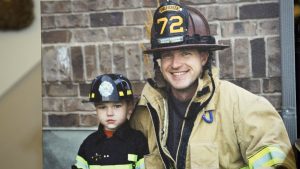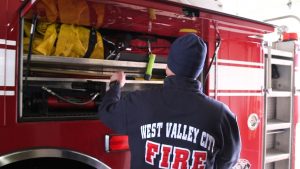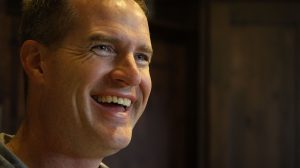Occupational Trauma Program Offers Help To First Responders Struggling With Mental Health
Nov 10, 2020, 9:43 PM | Updated: Nov 11, 2020, 3:43 pm
WEST VALLEY CITY, Utah — Like veterans who’ve served our country abroad, first responders in our own communities also deal with traumatic events that can impact their mental health. The unique challenge for many firefighters and law enforcement officers is that they also live in the same communities they serve in.
KSL-TV surveyed 364 Utah firefighters to better understand the quiet crisis first responders face, and what help is available.
Chad Burnside was among those who took the survey.
For him, being a firefighter is all about serving others. He’s been with the West Valley City Fire Department for nearly 14 years.
“I’ve loved being a firefighter. I’ve loved just going out and helping people,” he said.

Chad Burnside poses with his son who was also dressed up as a firefighter on Halloween. His son was the same age as his neighbor’s daughter when he was asked to help in a time of need. (Burnside family)
But it hasn’t come without a cost to his own mental and emotional well-being.
“It’s the lack of sleep, I think it’s the calls, I think it’s the stress and the pressure of performing at a moment’s notice,” he said.
Burnside isn’t alone: 77% of those surveyed reported the trauma from their job has impacted their lives and relationships.
“We don’t like to talk about the worst call we’ve ever been on because generally, that brings back a lot of memories and flashbacks,” he said.
Burnside said he will never forget Nov. 17, 2018.
“It’s very emotional to even talk about it,” he said. “[It’s] something that I relive nearly every day and that was involving my neighbor.”
Rather than a call at the station, Burnside got a knock on his front door just after arriving home from his 48-hour shift.
“Hey, buddy, what’s going on? Are you alright?” he asked the 8-year-old boy standing on his porch. “No, my sister’s not breathing,” the boy responded.
Burnside ran to his neighbor’s home.
“I jumped into action, took over and start doing compressions and doing everything I could to try to get her heart going again,” he said.
Despite trying his best, his neighbor’s daughter did not survive.
“It’s heartbreaking because … she’d be the same age as my youngest right now,” Burnside said.
“I always remember her coming over to the house and asking if she can get some tomatoes out of our garden,” he said. “It’s a call that really affected me as a person – and my relationship with my wife and kids.”
That particular call was the start of Burnside’s PTSD.
“That is what kind of triggered a lot of the anxieties and the fears and the hopelessness and the depression,” he said.
He said it got to the point where he didn’t feel like himself.

Chad Burnside has been a firefighter with the West Valley City Fire Department for nearly 14 years. He says the trauma he experiences at work impacts his mental health and family life. (KSL-TV)
“There was no happiness, there was no sadness, there was no joy, there was no pain. It was just kind of moving through life as a shell of myself — personality just disappeared,” he described.
Dr. Andrew Smith, a clinical psychologist at the University of Utah, said firefighters face a unique challenge.
“Doing hard, stressful, potentially traumatic work in the community that you also go to sleep at night over and over again, over a 10-, 15-, 20-year career can change the way that they experience those communities and their ability to be part of those communities,” he said.
In October 2018, Smith started the Occupational Trauma Program, specifically designed to target wellness and the heterotypic effects of trauma among first responders. So far they’ve helped 120 clients.
“We start with sleep, we start with alcohol, we start with relationships,” he explained.
Smith found after five therapy sessions, many clients experienced less severe PTSD and enjoyed greater quality of life. If after those initial sessions clients need additional help, Smith said they begin EMDR therapies or Cognitive Processing Therapy for more intense PTSD treatment.
“Their brain circuitry has to change in order to be able to encounter overdoses, and suicides and motor vehicle accidents and child deaths,” he said. “These are horrible things that happen and they affect people — and they affect people at a biological level.”
Smith said trauma manifests in a myriad of ways, not just PTSD.
“People come in saying, ‘Look, my marriage — or I don’t have any motivation and I haven’t been to the gym in months, or I’m drinking myself to sleep because if I don’t, I can never fall asleep,” he described.
He said many firefighters also struggle with the transition to home life after a stressful shift at the fire station.
“It’s hard to shift between focusing on worst case traumatic scenarios and kind of the subtle nuances of life,” Smith explained, such as the skinned knee of a child, or a spouse’s concerns over the school year.
Burnside said the chronic stress started to affect his marriage and relationship with his kids. Little things like unwashed dishes or unfolded laundry would set him off.
“And it got to the point where my kids were more happy to see me go back to work than to see me come home,” he said.
Burnside said he’s had to learn how to switch gears and leave work at the fire station.
“Coming home and having to change hats and get back to the patient, the relaxed, the kind, loving dad that kids need,” he explained.

Chad Burnside said the trauma from being a firefighter started affecting his marriage and relationships with his kids. (KSL-TV)
Smith said firefighters don’t readily seek treatment.
“Part of that is built into the culture – there’s sort of a hyper-masculine culture that also exists in military environments,” he said.
“Growing up as a kid, you always think, ‘Oh, firemen and policemen are tough as nails that nothing affects them,’” Burnside said.
He admitted it’s sometimes easier to internalize his feelings rather than face them.
Smith said many firefighters also don’t trust therapists who are not familiar with their profession. He said it’s a hurdle they must overcome.
“When we require the same experience as a foundation for treatment [or], a therapist [to] be credible enough, we’re already behind the eight ball,” he said.
Smith said they often address the concern at the beginning of therapy. He said it’s an approach that most of the time works well.
“Look, you need some help here. I want to provide it to you, but we have to deal with the elephant in the room and that is that I’m not a first responder, can we find a way?” he suggested.
It took Burnside nearly a year and a half to seek out help. He watched a webinar about behavioral health sponsored by his department.
“He was describing my life, he was describing everything that I was feeling at that time,” Burnside said. “I thought, ‘I need to do something to change the course that I’m on right now.’”
Since going to therapy, Burnside has found help and encourages others to also reach out.

It took Chad Burnside a year and a half before he reached out for help. He says things have improved ever since he started therapy. (KSL-TV)
“If you recognize that something’s not working right, or something’s not going right, get help. You’re not weak for getting help,” he said.
Smith also added his invitation.
“Of course, this has affected you. Instead of pretending that it hasn’t, let’s figure out the ways that it has so that we can start to get our hands around it,” he said.
The program is structured to offer anonymity for those who seek help.
“So that people can come get what they need and not be identified by their departments,” Smith said. “We decided pretty early on that if this thing was going to be successful, that it would have to be a trustworthy source.”
The United Fire Authority and Park City Fire contract with the University’s Occupational Trauma Program, pre-funding services for their firefighters.
The program is available to all first responders. Some insurances cover the cost, or you can pay an out-of-pocket rate. To set up an appointment, call 801-581-3258 or send an email to UNI_OP_Support_Staff@hsc.utah.edu.
Crisis Hotlines
- National Suicide Prevention Lifeline: 1-800-273-TALK (8255)
- Statewide/Salt Lake County Crisis Line: 801-587-3000
Online Resources
- NAMI Utah: namiut.org
- Utah Chapter-American Foundation for Suicide Prevention: afsputah.org/chapter/utah
- Suicide Prevention Lifeline: www.suicidepreventionlifeline.org












